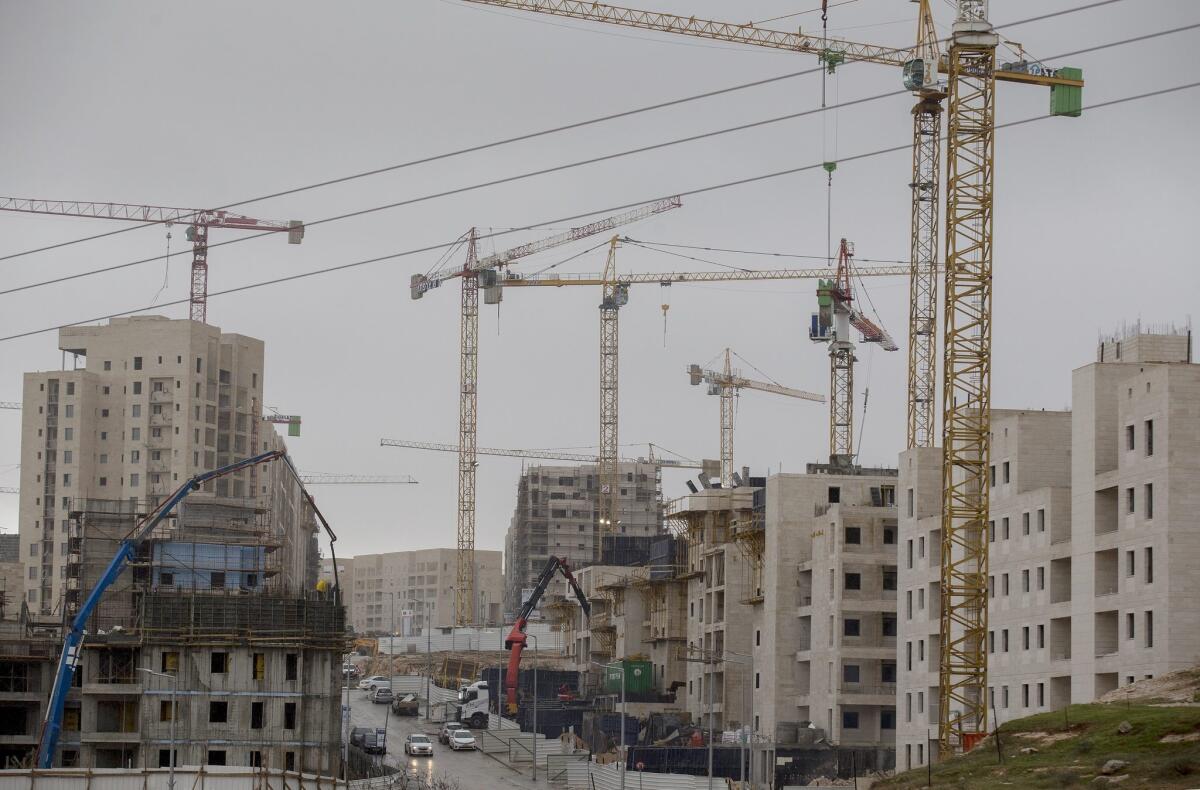Opinion: The segregation inside Israeli settlements

Construction is underway in the Har Homa settlement near the Palestinian East Jerusalem neighborhood of Sur Baher on Dec. 27.
- Share via
To the editor: I greatly appreciate The Times’ editorial on Israeli settlements. But it is also important to get back to the basics of what these settlements are. (“From bad to worse, as Israel pursues settlement expansion,” editorial, Dec. 28)
Israeli settlements are segregated communities: Jewish-only roads leading to Jewish-only houses. They are built on confiscated Palestinian homes, schools and farms as a way to ethnically cleanse those who originally lived there. And they are evidence that Israel was never sincere about peace talks. How can you claim to want to negotiate borders when you are doing everything possible to change the facts on the ground with a sustained land-grab campaign?
Israel has said that the United Nations resolution declaring these settlements illegal is unfair and one-sided. However, if you scratch the surface and learn what these settlements are really about, the real question becomes what took us so long to speak up?
Susan Kerin, Rockville, Md.
..
To the editor: We are in the middle of Hanukkah, which celebrates the rebellion against King Antiochus IV Epiphanes, the victory of the Maccabees in 167 B.C. and the liberation of the holy temple in Jerusalem. So should the Maccabees be considered occupiers? How can Israelis be occupiers in their own land?
It is time to admit that first and foremost, the Jewish people have historical roots and rights to the land of Israel. With that recognition, one could ask whether the Israelis are willing to give up part of their land for peace.
The Times asks if any solution other than two states exists. The simple answer is that Jordan (the East Bank) already is Palestine. That country occupied the West Bank from 1948-67. The Arabs living in Israel and in the West Bank need to reunite themselves with Jordan and become citizens of that land. They can stay where they live today, within the land of Israel, but have full citizenship rights including voting rights in Jordan.
This approach answers the dilemma that the Times has regarding the Jewish state being democratic while inhabiting the liberated lands of Samaria and Judea.
Nahum Gat, Manhattan Beach
..
To the editor: Your editorial objects to 6,000 new Israeli homes being built under Prime Minister Benjamin Netanyahu. You argue that those new homes for Jews only will split the Arab inhabited land and make a two-state solution impossible. All this is true.
Your editorial omits a critically important fact: Palestinians don’t get paid one cent for their land or homes that make room for Jewish homes.
Justice for all is a foundational belief of Judaism. Thou shalt not steal (except for Palestinian land) seems to be the settlers’ version of the commandment.
I agree that stealing (it is not just “taking,” it is stealing) Palestinian land and homes not only makes a two-state solution impossible; in addition, it fatally undermines Jewish belief in justice.
Robert Baker, Los Angeles
..
To the editor: This editorial identifies settlements as one of the biggest obstacles to peace but fails to state the biggest obstacle: the Palestinians’ refusal to recognize Israel’s right to exist.
If the Palestinians genuinely and sincerely changed their stance on this, the Israeli response would be a swift and significant pivot toward moderation and reconciliation. It’s a big “if” and perhaps a naive view at this time, but who knows what the future may hold?
Nate Tucker, Costa Mesa
Follow the Opinion section on Twitter @latimesopinion and Facebook
A cure for the common opinion
Get thought-provoking perspectives with our weekly newsletter.
You may occasionally receive promotional content from the Los Angeles Times.






